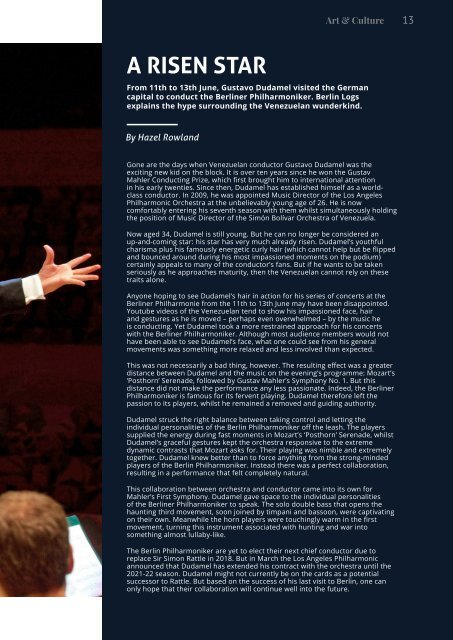Berlin Logs July 2015
Moving to Berlin can be an intimidating experience. Many of us arriving here have little grasp of the language, nowhere to live and no job. Such is the pull of Berlin that despite this, every year more and more people flood the city, eager to be part of Europe’s cultural capital.
Moving to Berlin can be an intimidating experience. Many of us arriving here have little grasp of the language, nowhere to live and no job. Such is the pull of Berlin that despite this, every year more and more people flood the city, eager to be part of Europe’s cultural capital.
Create successful ePaper yourself
Turn your PDF publications into a flip-book with our unique Google optimized e-Paper software.
Art & Culture<br />
13<br />
A RISEN STAR<br />
From 11th to 13th June, Gustavo Dudamel visited the German<br />
capital to conduct the <strong>Berlin</strong>er Philharmoniker. <strong>Berlin</strong> <strong>Logs</strong><br />
explains the hype surrounding the Venezuelan wunderkind.<br />
By Hazel Rowland<br />
Gone are the days when Venezuelan conductor Gustavo Dudamel was the<br />
exciting new kid on the block. It is over ten years since he won the Gustav<br />
Mahler Conducting Prize, which first brought him to international attention<br />
in his early twenties. Since then, Dudamel has established himself as a worldclass<br />
conductor. In 2009, he was appointed Music Director of the Los Angeles<br />
Philharmonic Orchestra at the unbelievably young age of 26. He is now<br />
comfortably entering his seventh season with them whilst simultaneously holding<br />
the position of Music Director of the Simón Bolívar Orchestra of Venezuela.<br />
Now aged 34, Dudamel is still young. But he can no longer be considered an<br />
up-and-coming star: his star has very much already risen. Dudamel’s youthful<br />
charisma plus his famously energetic curly hair (which cannot help but be flipped<br />
and bounced around during his most impassioned moments on the podium)<br />
certainly appeals to many of the conductor’s fans. But if he wants to be taken<br />
seriously as he approaches maturity, then the Venezuelan cannot rely on these<br />
traits alone.<br />
Anyone hoping to see Dudamel’s hair in action for his series of concerts at the<br />
<strong>Berlin</strong>er Philharmonie from the 11th to 13th June may have been disappointed.<br />
Youtube videos of the Venezuelan tend to show his impassioned face, hair<br />
and gestures as he is moved – perhaps even overwhelmed – by the music he<br />
is conducting. Yet Dudamel took a more restrained approach for his concerts<br />
with the <strong>Berlin</strong>er Philharmoniker. Although most audience members would not<br />
have been able to see Dudamel’s face, what one could see from his general<br />
movements was something more relaxed and less involved than expected.<br />
This was not necessarily a bad thing, however. The resulting effect was a greater<br />
distance between Dudamel and the music on the evening’s programme: Mozart’s<br />
‘Posthorn’ Serenade, followed by Gustav Mahler’s Symphony No. 1. But this<br />
distance did not make the performance any less passionate. Indeed, the <strong>Berlin</strong>er<br />
Philharmoniker is famous for its fervent playing. Dudamel therefore left the<br />
passion to its players, whilst he remained a removed and guiding authority.<br />
Dudamel struck the right balance between taking control and letting the<br />
individual personalities of the <strong>Berlin</strong> Philharmoniker off the leash. The players<br />
supplied the energy during fast moments in Mozart’s ‘Posthorn’ Serenade, whilst<br />
Dudamel’s graceful gestures kept the orchestra responsive to the extreme<br />
dynamic contrasts that Mozart asks for. Their playing was nimble and extremely<br />
together. Dudamel knew better than to force anything from the strong-minded<br />
players of the <strong>Berlin</strong> Philharmoniker. Instead there was a perfect collaboration,<br />
resulting in a performance that felt completely natural.<br />
This collaboration between orchestra and conductor came into its own for<br />
Mahler’s First Symphony. Dudamel gave space to the individual personalities<br />
of the <strong>Berlin</strong>er Philharmoniker to speak. The solo double bass that opens the<br />
haunting third movement, soon joined by timpani and bassoon, were captivating<br />
on their own. Meanwhile the horn players were touchingly warm in the first<br />
movement, turning this instrument associated with hunting and war into<br />
something almost lullaby-like.<br />
The <strong>Berlin</strong> Philharmoniker are yet to elect their next chief conductor due to<br />
replace Sir Simon Rattle in 2018. But in March the Los Angeles Philharmonic<br />
announced that Dudamel has extended his contract with the orchestra until the<br />
2021-22 season. Dudamel might not currently be on the cards as a potential<br />
successor to Rattle. But based on the success of his last visit to <strong>Berlin</strong>, one can<br />
only hope that their collaboration will continue well into the future.


